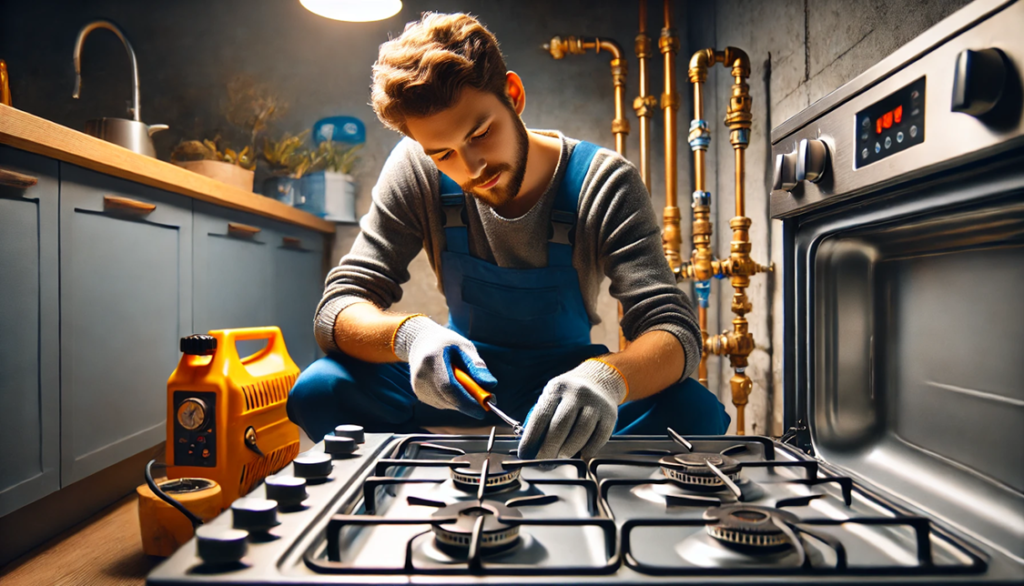Gas Appliance Repair in Austin: Safety First
Last Updated on 6 May 2025

Gas appliances are not just about convenience—they are essential in every home. Stoves, water heaters, and boilers make our lives comfortable, but they require regular attention and maintenance. As an experienced gas appliance repair technician, I have seen firsthand what happens when maintenance is neglected, often leading to serious consequences. In this article, I’ll discuss the most common malfunctions, how to identify and fix them, and, most importantly, how to do it safely.
Most Common Gas Appliance Malfunctions: Gas Leak, Weak Heating, and Extinguishing Flame
Throughout my years of working in appliance repair in Austin, I’ve noticed that most issues fall into three main categories:
- Gas Leak – This is the most dangerous malfunction that requires immediate attention. If left undetected, the consequences can be catastrophic.
- Weak Heating – This occurs in gas stoves and water heaters when they fail to reach the required temperature, making them inefficient.
- Extinguishing Flame – The flame keeps going out, which can be caused by faulty sensors, clogged burners, or gas supply issues.
Each of these problems requires careful troubleshooting, but first, it’s crucial to understand the root cause.
How to Identify a Problem and What to Do in Case of a Gas Leak
If you smell gas in your home, take immediate action:
✅ Open windows to ventilate the area.
✅ Turn off the gas appliance and shut off the gas valve.
✅ Avoid using open flames, turning lights on or off, or using any electrical appliances, as even a small spark can ignite the gas.
✅ Call emergency gas services or a professional technician.
If the smell is faint, you can try locating the leak by applying a soap solution to gas pipe connections and hoses. If bubbles form, there is a leak. However, even if you identify the issue, do not attempt to fix it yourself. A certified specialist should handle the repair to ensure safety.
When Can You Fix a Gas Appliance Yourself, and When Do You Need a Specialist?
Some minor issues can be fixed without professional help, such as:
🔧 Cleaning stove burners and jets from grease and carbon buildup. Sometimes weak heating is just due to a clog.
🔧 Checking the gas supply—sometimes the valve is partially closed or blocked.
🔧 Cleaning burner nozzles—if the gas flow is uneven, you can carefully unclog the tiny openings with a thin needle.
However, if the problem is more serious, never attempt to repair gas appliances yourself! This is especially true for gas water heaters, boilers, and modern stoves with electronic controls. These appliances involve both gas and electricity, and without proper knowledge, you could not only worsen the malfunction but also risk dangerous electric shock.
In my experience, many emergency situations are caused by untrained individuals trying to fix gas appliances on their own. If you’re unsure about a repair—call a professional.
The Importance of Regular Gas Appliance Maintenance
The best way to avoid repairs is preventive maintenance. Gas appliance repair is not just about fixing problems—it’s about keeping appliances in top shape. I always recommend that my clients have their gas equipment checked at least once a year.
A professional maintenance check includes:
✔ Cleaning burners and jets.
✔ Checking hoses and connections for leaks.
✔ Inspecting the gas valve.
✔ Evaluating the efficiency of safety sensors.
Regular servicing helps prevent leaks, improve appliance efficiency, and extend their lifespan.
Gas appliances require careful handling. If you experience a gas leak, weak heating, or an extinguishing flame, it’s essential to quickly diagnose the issue and fix it correctly. While minor problems can be handled independently, serious malfunctions should only be repaired by professionals.
Remember, safety is more important than saving money on repairs. Routine maintenance and timely diagnostics will help you avoid hazardous situations and ensure your home stays comfortable and safe!